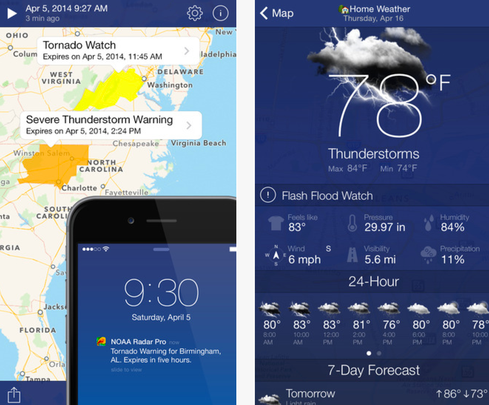AccuWeather Storms Into Enterprise With Predictive Analytics
AccuWeather Enterprise Solutions' new D3 analytics business unit is predicting more than just the weather. It's capitalizing on what has become one of the company's fastest-growing businesses, predictive analytics-as-a-service, to help clients make business decisions. AccuWeather's chief commercial officer shared the details.


11 iPhone, Android Weather Apps For Rain Or Shine
11 iPhone, Android Weather Apps For Rain Or Shine (Click image for larger view and slideshow.)
"Everybody talks about the weather, but nobody does anything about it," is a quote often attributed to Mark Twain. While we can't change the weather itself, many companies are using weather data combined with other data streams to make better strategic and tactical business decisions.
AccuWeather, a company best known for its consumer weather prediction and media business, has been informally consulting with organizations for two decades on how to use weather data and other data to make better business decisions. The company formally launched a predictive analytics-as-a-service business about three years ago and last month moved even deeper into the space with D3 Analytics, a division that specializes in this service of aggregating and analyzing hundreds of weather factors, together with consumer and sales data. The division provides insights to companies in the retail, healthcare, financial services, and other industry verticals.
"An amazing number of things are influenced by weather in terms of retail sales," Casey McGeever, chief commercial officer for AccuWeather Enterprise Solutions told InformationWeek in an interview. They aren't just the obvious things, like whether a retailer should stock more snow shovels and rock salt.
"We can go into a company that has, say, a thousand different kinds of candy. We can predict the sales of candy by each type at each store on each day. In fact, if we get the right data in advance we can even predict sales on an hourly basis. It's stunningly precise," he said.
AccuWeather is taking its own weather data streams, its commercial customers' data streams, and public information data streams such as census data, for example, and aggregating them not only to surface new big-picture insights but also to deliver recommendations for individual locations of the business and individual retail SKUs.
[Read more about why weather is big business. Check out IBM Buys The Weather Company In Watson IoT Push.]

Casey McGeever, chief commercial officer, AccuWeather Enterprise Solutions
"We are making very specific and very detailed predictions and then rolling them up to create actionable, impactful advice," McGeever said. "If you start by averaging things out, you lose a lot of the variance in the underlying data, and therefore your solution is inherently less valuable."
McGeever is trained as both an engineer and an MBA, and he brings those disciplines to his role at AccuWeather Enterprise. He says he is one of the few people at the company who is not a meteorologist.
McGeever said the overall solution is much more important than the data itself. AccuWeather has access to weather information, demographic data, SKU sales data and more.
"We are a powerhouse in terms of data," he said. "Data is necessary, but not sufficient, to solve problems. The methods you use to process it are even more important than having a lot of data."
That concept is what's behind the services that AccuWeather Enterprise is offering. This privately-held company is not naming its customers or providing details about the predictive methods and models it is using. It has signed NDAs with customers and is protecting its proprietary methods as its own "secret sauce."
However, McGeever said AccuWeather counts many Fortune 500 companies among its clients.
Customers' Needs
Typically customers start with a consulting engagement to get a scope of what needs to be done. They may be trying to optimize for ad spend, introduce a new product, or improve the logistical delivery of products. Customers who continue with the engagement typically become subscription and longer-term consulting clients, McGeever said.
AccuWeather does not release financials, and McGeever declined to comment on the size of the predictive analytics consulting and subscription business. He did say that it's a significant portion of the commercial business, and it is growing faster than the rest of the business.
"All companies understand that big data is a critical thing," he said. "They all understand they should be using it somehow, that it should be impacting their businesses. And yet having huge databases of stuff is inherently unattractive."
There are plenty of companies out there offering their own slant on predictive analytics as a service, McGeever said. Some are big consulting companies. Others are firms more focused on working in niche industries or providing access to particular data streams. McGeever said the weather is fundamental to all of it.
Making Analytics Work
On the commercial side of the business, AccuWeather can predict conditions 800 days ahead for organizations wondering, for example, how many window air conditioners to manufacture for a particular season. Of course, an 800-day forecast is the least accurate forecast. A retailer might later want to use a shorter term forecast to make decisions about which geographic areas will experience more demand for air conditioners and change inventory shipped to those retail locations based on that updated forecast.
Another use-case, McGeever said, is to look back at the impact of weather conditions. For instance, public companies experiencing sales declines may indicate in their 10-Q or 10-K documents that the weather was responsible.
"We often get calls from senior management who say they are being told that by their senior staff and want to know if it's true," he said. If it is true, they want to know how to prevent that outcome in the future.
Another use-case is getting out the vote on election day when you are running a political campaign. Demographic, census, and weather data is available to provide campaigns with predictions about which voters are most likely to turn out on election day. Campaigns can use those predictions to make better decisions on how to spend their campaign dollars in the final weeks leading up to the big day, whether it's voter registration (if there's still time), more ad spend on particular groups, or something else.
A final use-case that McGeever shared has to do with the pharmaceutical industry overall, but also with the health of individuals. If weather interrupts the supply chain and drugs aren't delivered to pharmacies, the impact can be far-reaching.
For patients who are meant to take a particular drug for their whole lives -- say a blood pressure or cholesterol medication -- there is certainly an impact if they are unable to get the drug due to a weather interruption of the supply chain. But the more surprising impact is that if they stop taking the drug, they tend to stop taking it altogether.
"It's not healthy for them," McGeever said. "Weather can have a huge impact on the health of people."
**New deadline of Dec. 18, 2015** Be a part of the prestigious InformationWeek Elite 100! Time is running out to submit your company's application by Dec. 18, 2015. Go to our 2016 registration page: InformationWeek's Elite 100 list for 2016.
About the Author
You May Also Like






